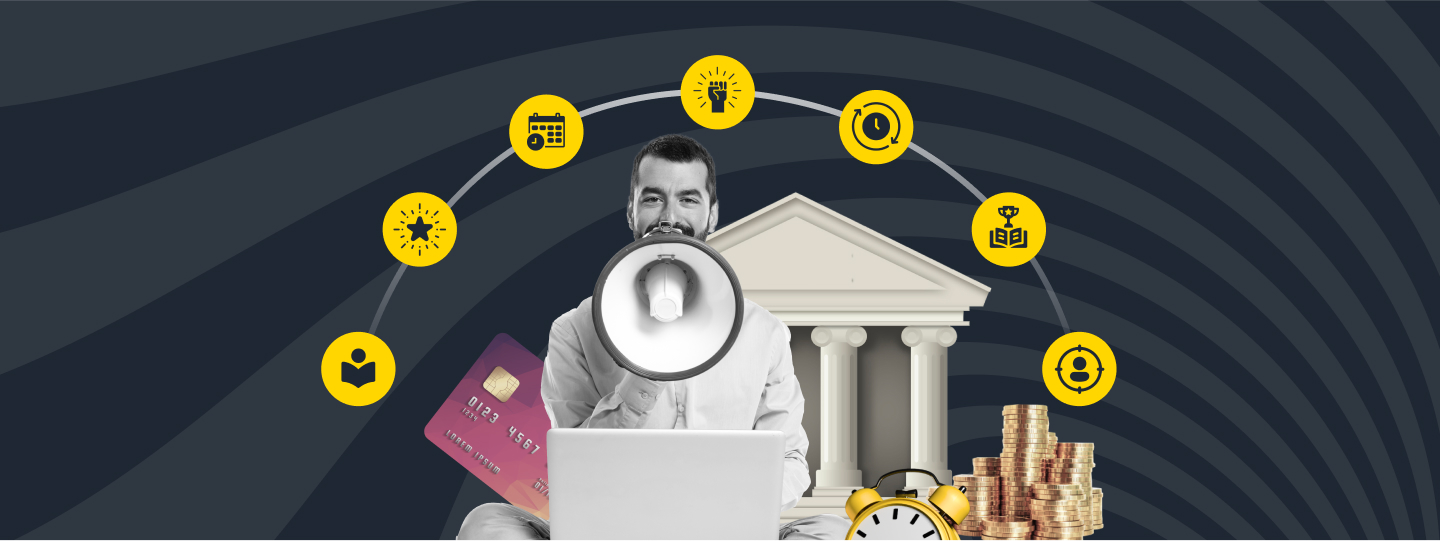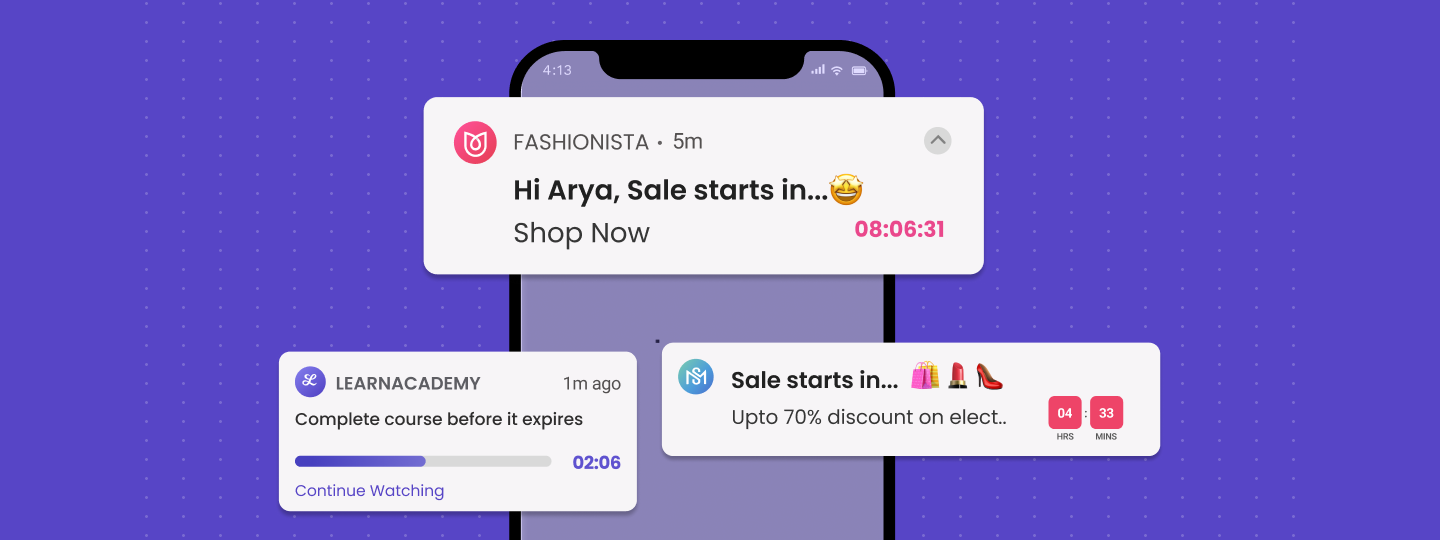Do you need help deciding which Marketing Automation tools to include in your arsenal? Perhaps you require a push notification tool, a micro-segmentation tool, or even a chatbot tool – but the options can be overwhelming.
It is important to remember that you’re not alone in this challenge. According to WebEngage’s Marketing Automation Survey, the top three hurdles marketers face are online lead generation, multi-channel engagement, and product discovery.
When choosing a Marketing Automation tool, the setup and license costs can significantly influence a marketer’s decision. Moreover, many tools are too complicated to use or lack crucial features, causing marketers to hesitate to adopt them despite their potential for increasing sales.
How Automation Can Boost Sales and Marketing
Marketing automation can be a game-changer for businesses looking to boost sales by streamlining processes and automating repetitive tasks. As a result, companies optimize their marketing campaigns and ultimately see an increase in revenue. Here are a few ways in which Marketing Automation can help companies to boost their sales:
Automated Lead Generation
One of the primary ways to boost sales with Marketing Automation is by automating lead generation. Sales automation tools can capture leads through forms on a website, social media, or other channels. Once a lead is captured, Marketing Automation can assign them to the appropriate sales team member, ensuring a prompt follow-up. By automating lead generation, businesses can capture leads more efficiently and ensure that no leads fall through the cracks.
Nurturing Leads
Marketing Automation can also help businesses nurture leads by providing relevant content at the right time. By tracking a lead’s behavior and interests, Marketing Automation tools can deliver personalized content, such as email campaigns, blog posts, or social media updates. This is the perfect example of how lead conversion with Marketing Automation can help build trust and engagement and increase conversion rates.
Customer Segmentation
Marketing Automation can help businesses segment their customers based on demographics, behavior, and other factors. This allows businesses to create targeted campaigns that resonate with specific segments of their audience. By understanding their audience’s interests and needs, companies can create personalized campaigns that are more likely to convert into sales.
Personalized Marketing
Finally, you can also boost sales with Marketing Automation by creating personalized marketing campaigns that resonate with their audience. By using data such as demographics, behavior, and interests, businesses can deliver targeted messages to their audience. This helps increase engagement and loyalty, ultimately leading to increased sales.
Examples of Companies Using Marketing Automation to Increase Sales:
Netflix
Netflix uses sophisticated Marketing Automation to analyze users’ preferences and viewing history. It then suggests shows and movies that are most likely to interest them.
This customized homepage has been hugely successful, with the recommendation system influencing 80% of the content watched on the platform. With 148.86 million subscribers and a watch time of 1 billion hours per week, Netflix is a prime example of how Marketing Automation can help businesses succeed.
Buffer
Buffer, a social media management company, created an app called Pablo for post-scheduling and sharing. They used Marketing Automation software to test new app features engagingly and interestingly.First, they identified their most recent and engaged Pablo users and asked about their experiences and pain points while using the app. Then, during the chat, Buffer enabled new features and asked for user feedback.
This approach was a success and helped Buffer save on beta-testing costs. As a result, Pablo receives a high amount of daily traffic, with 1,81,732 unique visitors per day and 4.65 pages checked per visit.
In our conversations with B2B marketers, we noticed marketers also struggle to build a simple Marketing Automation system that brings in customers and clients on autopilot. That’s why we decided to show you the simplest way to get started with Marketing Automation, the exact system which old-school growth marketers use to increase sales without breaking the bank.
Once you set up your Marketing Automation system, you’ll be able to…
- Attract a constant flow of qualified prospects into your business
- Build your credibility and trust through education-first marketing
- Deepen your relationship with leads with personal touches
- Convert leads into customers and advocates for your products
All of this without spending your budget on newly-minted growth hackers or unnecessary tools.
Step 1 –Inviting prospects into your business
Step 2- Introducing prospects to your products and services
Step 3 –Advancing the sale with hands-Off, personalized touches
Step 4 –Converting leads into customers and advocates
Step 1 – Inviting prospects into your business
Some of the most successful growth marketers use education-first marketing to attract their ideal prospects into their businesses. The first step in creating a strong foundation for your Marketing Automation system is to find a way to show prospects that you can help them.
You should demonstrate to your prospects that you can solve their problems by publishing a digital or physical book, creating a frequently updated blog filled with infographics, videos, and long-form articles, or hosting an in-person and online event.
In fact, there’s no shortage of ways to educate your prospects; however, the most cost-effective method old-school growth marketers use today is a content hub, where prospects can find answers to their most pressing questions and tools they can use immediately.

The easiest way to create the material you need to populate your content hub is by answering 15 questions your prospects are asking and then the 15 questions they should be asking but do not. This will give you 30 distinct pieces of educational content to attract potential prospects. You should provide your content in text, audio, or video format, if possible.
Personally, we prefer to start with text because it can be outsourced to freelance copywriters on Upwork, for example. You simply compile your questions and ask a freelance copywriter to provide detailed answers to each question based on their research. You can also use AI tools such as ChatGPT or Google’s Bard to write content for you in a matter of seconds.
Once the answers are ready, you can go ahead and repurpose that content into audio, video, and infographics according to what is suitable to your business needs. Now that you know how to get the content created for your hub, let’s dive into the technical details of publishing it so that your prospects can access it from anywhere, anytime.
To publish your content, there are two options here, a paid content management system or a free one.
Instead of relying solely on paid options, consider building a simple Marketing Automation system within your budget.
A great alternative is WordPress, which is a free content marketing system used by more than 20% of the websites. You can start with WordPress and build on it later. It’s extremely easy and affordable to hire a WordPress developer on Upwork or Fiverr to set up your content hub in just a couple of hours, assuming you have all your assets and content handy.
If you don’t want to use WordPress for any reason, here are some popular alternatives to WordPress, including Drupal, Joomla, and Jekyll; any one of these is sufficient to get you started on your way to setting a simple Marketing Automation system that boosts your sales.
Step 2 – Introducing prospects to your products and services
You’ve got your content hub setup, and it’s attracting potential customers to your business. Your prospect is visiting your site and finding answers to their most important questions. You’ve shown them that you understand their problems, you’ve got the expertise they’re looking for, and you can help them achieve their desired results faster with your unique solutions.
However, that doesn’t mean everyone who visits your content hub will be ready to make a purchase decision immediately after consuming most, if not all, of your educational content.
In fact, according to Smart Insights, only about 3 percent of your potential customers are ready to make a purchase decision at any given time; the other 97 percent need more time to decide or aren’t convinced your solution is the best one for them or simply want additional information before they move forward.

That’s why old-school growth marketers always find a way to introduce potential customers to their products and services, and that’s precisely what you’re also going to do next. The most effective way to engage prospects who know about your products or services and turn them into qualified leads to make a well-informed purchase decision is to offer them a taste of what they’ll get as customers.
Consider these examples; if you want to attract potential prospects, it’s recommended that you start by offering a free demo or trial service. The type of free service you offer can vary based on the industry you cater to. For instance, if you sell software or memberships, consider providing a 14-day trial for customers to enroll in. On the other hand, if you sell consumables, such as fast-moving consumer goods (FMCG), you can offer a small sample product for free.
If you provide professional services, consider offering a 30-minute consultation for free to help prospects understand how your services can benefit them. Tailoring your free services to your specific industry can help you attract potential customers and showcase the value of your offerings.
Before we jump into some of the low-cost Marketing Automation tools you can use for this process, here’s an example of how a growth marketer who sells subscription software introduces a product to their potential prospects visiting the content hub.

As you can see, this growth marketer is offering prospects a free 14-day trial of his subscription software so qualified prospects can take the software for a test drive and decide if this solution satisfies their unique needs.
Here’s another example of how another growth marketer who sells professional services introduces potential prospects to their done-for-you services.

In this case, the marketer is offering prospects a free, no-obligation discovery call to answer their prospect’s unique questions about the services. Now, here’s one affordable tool you can add to your Marketing Automation stack to make the process as seamless as possible, assuming you’re using WordPress as your content management system, as suggested earlier.
OptinMonster is one of the most powerful conversion optimization and lead generation software many smart marketers use to make targeted offers to their website visitors.
One feature that will prove useful to you for introducing your product or service to prospects in the manner described earlier is the option to add an attention-grabbing, full-screen welcome mat to every page on your content hub.
Another feature of OptionMonster you should experiment with is the slide-in scroll box form, which helps you present targeted offers to prospects as they move down a page or are about to disengage and leave your content hub. OptinMonster has a WordPress plugin, great documentation, and exceptional customer support, so your WordPress developer should be able to integrate it into your content hub fairly quickly.
Step 3 – Advancing the sale with hands-off, personalized touches
At this point, your content hub is up and running; prospects are already finding your detailed answers to their questions useful and valuable. And those who are strongly considering your product or service have accepted your free trial or your free consultation, or your free sample. Your qualified leads can make a purchase decision soon, all by themselves. Still, life usually gets in the way, and your leads may postpone their decision. Or they might decide to keep shopping and comparing alternatives. Or they simply need to get buy-in from other stakeholders, like bosses and colleagues, friends and family.
Old-school growth marketers expect this behavior from qualified sales leads and have contingency plans for moving the sale forward without being too pushy and annoying. That’s why they always have an automated follow-up system, so here’s how you can also use sales automation tools to advance the sale with hands-off, personalized touches.
If you ask random marketers why they don’t have follow-up systems, you’ll hear something along the lines of “I don’t know what to say or send to my sales-qualified leads” or “I’ve sent emails, but my leads are not responding, they don’t open or respond to emails.”
The easiest solution to this problem is sending them the same educational content that interested them initially in your business but in a different format. So, you’d repurpose all your answers from your content hub into video, infographic, or audio, even a PDF, and send it to them.
This works because people have different learning and buying modalities, and one of these formats will eventually give them the confidence to get over the fence and make a purchase. You can find a freelancer on Upwork or Fiverr who can convert your content into different formats. Let’s take a look at two Marketing Automation tools you should use to send the right content, to the right person, at the right time.
The first Marketing Automation tool we’d recommend for this process is WebEngage, an email marketing and automation platform used by thousands of growth marketers in different industries, including e-commerce, professional services, and software. You’d be pleased to know that WebEngage has a wide variety of responsive newsletter templates to choose from. If you don’t find anything that meets your exact needs, you can customize any of the templates to your liking using their intuitive campaign designer.
Also, if you’re ever short of messages you can send to leads and customers, you’ll find Moosend’s Marketing Automation recipes very valuable. For example, there’s a website re-engagement recipe inside Moosend for people who haven’t visited your website for a while.

You can also use SMS marketing as an additional method of staying in touch with your qualified leads because it makes the communication more personalized than automated email marketing alone, and using more than one communication channel means prospects are likely to get your messages.
For SMS marketing too, WebEngage’s pay-as-you-go pricing makes it a no-brainer to get started. You can send, deliver and manage high-volume SMS campaigns from wherever you are through their cloud-based, user-friendly web SMS platform.
You can also take advantage of SMS Warriors’ powerful API and hire a developer to integrate SMS marketing into the simple Marketing Automation system within a few hours when you decide to go beyond the basics you’ve set up here.
Step 4 – Converting leads into customers and advocates
You’re one step away from completely automating your sales and marketing process so that customers can get their hands on your product or service without you always being present to sell and take orders from them.
Your content hub is now attracting customers to your business, your lead magnet – free trial, no-obligation consultation, or free sample – is helping you identify qualified leads for your product or service, and your follow-up system keeps reminding them of what you have to offer. It’s time to automate and convert your leads into customers and advocates. To convert your leads into customers, you’ll need an order form that can automatically process payments and provide information on how customers can access their product or service.
For a secure, high-converting order form, you can try Samcart or PayKickstart as an alternative to hiring a developer to create a custom one because of how quickly you can get an order form ready to accept payments. Both services allow you to give your customers the option to pay with a credit card or PayPal. Additionally, both Samcart and Paykickstart make it easy to set up split payments so that your customers can spread their investment over several months, which will definitely increase your conversions as your product become more affordable, relative to paying the full price upfront.
To turn your customers into advocates, you simply have to deliver a great product or service and then ask everyone who’s pleased with their purchase to give you a testimonial and referral.
To find out whether your customers are delighted with your product or service, you should use Retently to send them an NPS Survey shortly after you deliver your product or service.

Using Retently’s multi-channel survey feature, you can send the one-question NPS Survey to your customers via email, text, or website to measure their satisfaction. After rating your product or service, you can customize the open-ended questions customers see.
One more reason to use Retently is to identify your advocates and unsatisfied customers, for that matter, is that they have native integrations with other sales and Marketing Automation software you’re already using, including WordPress, PayPal, and Stripe.
Your ideal next step
You now know how to set up a simple sales and Marketing Automation system that handles all the major activities of turning strangers into customers for your business. You have the foundations of the exact system that old-school growth marketers use, so you can also…
- Attract a consistent flow of qualified prospects into your business using valuable, educational content you’ve published on your content hub in different formats
- Build your credibility and trust by offering your qualified candidates a taste of what they get when they decide to make an investment in your product or service
- Deepen your relationship with leads with a personalized, hands-off follow-up system that reminds your qualified prospects about the products and services you have
- And you can also convert leads into customers and advocates without selling, taking orders, and asking for testimonials and referrals in person
Go ahead, implement this system, and be on the lookout for other sales and Marketing Automation tools that’ll improve your customer’s experience of doing business with you.
FAQs
- Can Marketing Automation help with customer retention?
Yes, Marketing Automation can help with customer retention by allowing businesses to segment customers based on behavior and preferences and then deliver personalized communication to keep them engaged and satisfied. - How can I use Marketing Automation to generate more leads?
You can use Marketing Automation to generate more leads by creating bespoke, targeted campaigns that offer relevant content and incentives to potential customers. - How can I measure the success of my Marketing Automation efforts?
The success of Marketing Automation efforts can be measured by keeping track of metrics such as lead conversion rates, email open and click-through rates, website traffic, and customer retention rates. - How can Marketing Automation increase sales?
You can boost sales with Marketing Automation by allowing companies to capture and convert more leads. It can also help with customer segmentation and personalized marketing, increasing marketing campaigns’ effectiveness and improving customer satisfaction.


































 Kasturi Patra
Kasturi Patra
 Dev Iyer
Dev Iyer
 Ananya Nigam
Ananya Nigam



